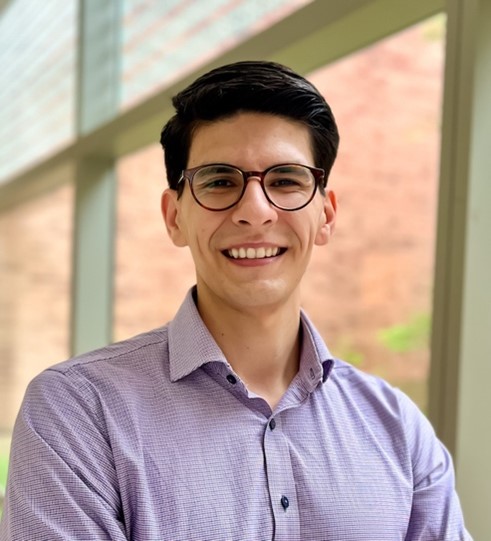Human Eosinophil Section
Gregory M. Constantine, M.D.
Assistant Research Physician, Human Eosinophil Section (HES), Laboratory of Parasitic Diseases (LPD)
Specialty(s): Allergy and Immunology, Internal Medicine Provides direct clinical care to patients at NIH Clinical Center

Major Areas of Research
- Characterization and treatment of eosinophilic disorders, including eosinophilic esophagitis (EoE) and other eosinophilic gastrointestinal disorders (EGID), and hypereosinophilic syndromes (HES)
- Sensory mechanisms of EGID-related symptoms
- Role of environmental exposures on gut inflammation
- Eosinophil biology and maturation
Program Description
Dr. Constantine’s research focuses on understanding tissue remodeling and neuroimmune mechanisms that may underpin ongoing symptoms in patients with gastrointestinal inflammatory (GI) conditions, including eosinophilic esophagitis (EoE) and other eosinophilic gastrointestinal diseases (EGID). Additionally, his research explores the influence of environmental factors, such as chemical exposures found in water systems and in processed food and food packaging, on gut inflammation.
Our clinical studies aim to improve EGID diagnosis through the implementation of minimally invasive diagnostic tools, such as the esophageal string test, ultimately enhancing patient care and outcomes.
In the Human Eosinophil Section, Dr. Constantine is an investigator on multiple protocols addressing eosinophilic disorders including eosinophilic esophagitis and other EGIDs and serves as a site-investigator for the Consortium of Eosinophilic Gastrointestinal Researchers (CEGIR) through NIH/NCATS/RDCRN.
Biography
Education
M.D., University of Texas Long School of Medicine, San Antonio, TX
Residency, Internal Medicine, Baylor College of Medicine, Houston, TX
Chief Residency, Internal Medicine, Baylor College of Medicine, Houston, TX
Fellowship, Allergy and Immunology, National Institute of Allergy and Infectious Disease, NIH, Bethesda, MD
Gregory Constantine, M.D., is an Assistant Research Physician Clinician at NIAID. He has been involved in translational research in eosinophilic disorders since joining the Human Eosinophil Section in 2020.
He received his M.D. from the University of Texas Long School of Medicine, followed by a residency in internal medicine at Baylor College of Medicine (BCM). He was then selected and served as the chief resident and clinical instructor at BCM before completing subspecialty training in allergy and immunology at NIH.
At NIH, he serves as a core faculty member in the Allergy & Immunology Fellowship Training Program. His external committee activities include involvement in the Eosinophilic Gastrointestinal Disorders and Cells and Mediators of Allergic Inflammation Committees through the American Academy of Allergy, Asthma & Immunology.
Clinical Studies
Activation and Function of Eosinophils in Conditions With Blood or Tissue Eosinophilia, NCT00001406, Associate Investigator
Zemaira Eosinophilic Esophagitis Pilot Study (ZEEPS), NCT05485155, Principal Investigator
Selected Publications
Wright BL, Abonia JP, Abud EM, Aceves SS, Ackerman SJ, Braskett M, Chang JW, Chehade M, Constantine GM, Davis CM, Dellon ES, Doyle AD, Durban R, Hill DA, Jensen ET, Kewalramani A, Khoury P, Klion AD, Kottyan L, Kuang FL, McGowan EC, Ruffner MA, Spencer LA, Spergel JM, Uchida AM, Wechsler JB, Pesek RD. Advances and ongoing challenges in eosinophilic gastrointestinal disorders presented at the CEGIR/TIGERs Symposium at the 2024 American Academy of Allergy, Asthma & Immunology meeting. J Allergy Clin Immunol. 2024 Oct;154(4):882-892.
Khalid MB, Sharma D, Howard A, Akbulut D, Sampaio de Melo M, Quezado MM, Castillo PA, Cuevas GA, Klion AD, Khoury P, Constantine GM, Kumar S. Gastrointestinal segmental remission with oral budesonide therapy for eosinophilic gastrointestinal diseases. J Allergy Clin Immunol Pract. 2024 Oct;12(10):2857-2860.e2.
Oikonomou V, Smith G, Constantine GM, Schmitt MM, Ferré EMN, Alejo JC, Riley D, Kumar D, Dos Santos Dias L, Pechacek J, Hadjiyannis Y, Webb T, Seifert BA, Ghosh R, Walkiewicz M, Martin D, Besnard M, Snarr BD, Deljookorani S, Lee CR, DiMaggio T, Barber P, Rosen LB, Cheng A, Rastegar A, de Jesus AA, Stoddard J, Kuehn HS, Break TJ, Kong HH, Castelo-Soccio L, Colton B, Warner BM, Kleiner DE, Quezado MM, Davis JL, Fennelly KP, Olivier KN, Rosenzweig SD, Suffredini AF, Anderson MS, Swidergall M, Guillonneau C, Notarangelo LD, Goldbach-Mansky R, Neth O, Monserrat-Garcia MT, Valverde-Fernandez J, Lucena JM, Gomez-Gila AL, Garcia Rojas A, Seppänen MRJ, Lohi J, Hero M, Laakso S, Klemetti P, Lundberg V, Ekwall O, Olbrich P, Winer KK, Afzali B, Moutsopoulos NM, Holland SM, Heller T, Pittaluga S, Lionakis MS. The Role of Interferon-γ in Autoimmune Polyendocrine Syndrome Type 1. N Engl J Med. 2024 May 30;390(20):1873-1884.
Constantine GM, Khoury P. Overlap of eosinophilic esophagitis with inborn errors of immunity and immune dysregulation. J Allergy Clin Immunol. 2024 Jun;153(6):1529-1532.
Constantine GM, Klion AD. Recent advances in understanding the role of eosinophils. Fac Rev. 2022 Sep 27;11:26.
Constantine GM, Metcalfe DD, Akin C, Sun X, Bai Y, Eisch AR, Maric I, Komarow HD. Remission of indolent systemic mastocytosis in the absence of targeted therapy. J Allergy Clin Immunol Pract. 2022 Aug;10(8):2163-2165.e2.
Research Network
Consortium of Eosinophilic Gastrointestinal Researchers (CEGIR)

